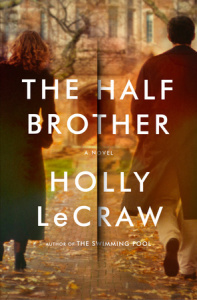 Physical and spiritual love – a psychological novel (Massachusetts, roughly 1990s to post 9/11; Atlanta, earlier in backstories): Put on your thinking cap! You’ll be lulled by the elegiac prose and the Currier & Ives imagery, but like our sensitive narrator who grew up in Atlanta suspecting “something easily missed, a golden egg hidden in the deepest underbrush,” you will too in this emotionally suspenseful, nuanced novel. Yes, there are secrets and ah-ha moments, thoughtfully plotted, revealed slowly. Even the title is thought-provoking. It could have been plural since there’s two half-brothers. But like everything that matters in Holly LeCraw’s cerebral novel, she makes us think. What better vehicle than through the psyche of Charlie Garrett, who deems his best asset is he’s a “thinker.” He “had to get closer and closer to things, all the time, see their astonishing thingness as thoroughly as I could.”
Physical and spiritual love – a psychological novel (Massachusetts, roughly 1990s to post 9/11; Atlanta, earlier in backstories): Put on your thinking cap! You’ll be lulled by the elegiac prose and the Currier & Ives imagery, but like our sensitive narrator who grew up in Atlanta suspecting “something easily missed, a golden egg hidden in the deepest underbrush,” you will too in this emotionally suspenseful, nuanced novel. Yes, there are secrets and ah-ha moments, thoughtfully plotted, revealed slowly. Even the title is thought-provoking. It could have been plural since there’s two half-brothers. But like everything that matters in Holly LeCraw’s cerebral novel, she makes us think. What better vehicle than through the psyche of Charlie Garrett, who deems his best asset is he’s a “thinker.” He “had to get closer and closer to things, all the time, see their astonishing thingness as thoroughly as I could.”
The first hint you’ll get comes early on in the novel as a poetry lesson and early in Charlie’s 17 years of teaching English at the Abbott School, a “cloister-let:” a small, picturesque New England boarding school perched atop “softer mountains than the Berkshires,” in Abbottsford, 90 miles from Boston in north-central Massachusetts. The school/town may be fictitious, but this is the area of the country with the most private boarding schools; this one “genteelly clinging to the second-tier.” Charlie feels like a fraud because he got into Harvard and Abbott through the “old order” of wealth and connections. But at 22, fresh in his first job, illuminating a complex 17th century “metaphysical” poem divining physical and spiritual love, he soon validates his intellectual capabilities.

John Donne, 17th century portrait
(Paul Haymon at en.wikipedia
[Public domain], via Wikimedia Commons)
“Look at every word. Every word is there for a reason, probably ten reasons. Get closer and closer. Be patient.” … Trust yourself. These poems aren’t something to get. They are something to apprehend. Apprehend: to take hold of. To pay attention. Pay attention and the meaning will open up.”
One surprise I can impart without giving anything away is about the prose. I expected the coolness of New England, not the warmth of Southern manners. Actually, the prose is more a mix of North and South, ideal as Charlie, and other characters, have deep Southern roots. Charlie’s sensitivity to his surroundings resonates in prose that combines the reserve of New Englanders with the elegance of Southerners. (Although, sometimes characters’ emotions let loose, unable to control all they’ve bottled up.) The author is from Atlanta, now living outside Boston, which must account, in part, for the authentic feel of the prose.
The pull of home is ever-present. It arrives with Charlie’s first impressions of the serene campus: “green rolling fields and white buildings, a chapel of gray stone – foreign and familiar, like scenes from a picture book.” This “little farm of learning” was meant for him. In boyhood, he discovered the magic of learning in his stepfather Hugh’s “leathery, book-lined study.” (Books were “like a time machine, taking me back and sideways to other minds and times and cities and planets.”) He also values the students – “all of them, even those nature hadn’t favored … they were changelings, they were becoming.” Most dominant is Charlie’s home, “a thoroughly New England mishmash that, even so, struck me as a little southern.” At 29, he’s awfully young to own a large farmhouse abutting splendid mountains, a “destination.” For ten years of this story, it emits such a strong presence, taking on “a life” of its own.
But Atlanta’s “ghosts were thick,” so they come North with him, where they hover, haunt, and shake-up Charlie’s three most important, emotionally-laden relationships, structured in sections titled May, Nicky, Anita. The dynamics of all three twist and turn, shift in and out of Charlie’s life over the years. Throughout, you’ll be amazed at the noble lengths he goes through to protect and honor these three. When one of Charlie’s students asks if love is selfish, his moral compass shows us just how selfless love can be:
MAY: or “May-May,” an affectionate nickname that once mortified Charlie when a slip of his tongue in class, when May was his student during his second year teaching. By then, it confirmed our sense that all along Charlie harbored passionate feelings for the young daughter of the school’s chaplain, Preston Bankhead, “an institution.” (Charlie aches to get closer to Preston’s “purported magic.” But even when he falls into being his chess partner he can’t; he “exuded intimacy only from far away, in the pulpit.”) Charlie first spots May, a slender beauty, when she’s surrounded by her picture-perfect family (three blond brothers and blonde mother from Savannah; Preston from New Orleans.) May grew up at Abbott. Charlie adores everything about her: hands, hair, and eyes, “hemispheres of ocean and sky, and I was sailing over them using only the old knowledge of the stars” (Poetic words that echo Donne’s). Among Charlie’s many admirable traits is endurance, so he patiently waits for May to mature. When she does – that embarrassing incident in class – tenderly reveals his rapture.
NICKY: the other, younger half-brother. The “favored son.” Glamorous, a golden-boy whose “red-gold curls draw the sun” and everyone to him like a magnet. A math genius who appreciates the elegance of math but not its purpose, he sought relief work in Haiti and then Afghanistan, which couldn’t possibly have worked out for someone “who expected magic to pop out of a box or a song.” So, Nicky follows his brother’s path to Abbott, where he “wants to scatter his light as he walks.” Charlie always puts him first, but that light casts foreboding, dark shadows. Nicky’s terrible sloppiness befits his fecklessness.
ANITA: whom Charlie never calls Mother. Did he when it was just the twosome, before Nicky came along and Charlie became the outsider? In Atlanta, whenever the threesome were together, Charlie “let them love each other, let them carry all the energy.” Anita is well-suited as a nurse: practical, unruffled, and extremely discrete, except she’s that way with Charlie (“telling me anything would have been breaking our rules of engagement”) and Nicky, who doesn’t, or isn’t wired, to notice. She too ends up at Abbottsford needing Charlie.
Other central characters bring diversity onto the campus, friendships and extended families for Charlie, plus emotional sub-plots:
THE MIDDLETONS: Charlie’s Jewish landlord, Anita; her African American husband, Booker, the school’s groundskeeper; and one of their children, Zack, who becomes a popular football star in Charlie’s class with loftier aspirations.
THE LOWELLS: Divya, Charlie’s colleague, from India; and husband Win whose dedication/obsession for caring for a labyrinth of boxwoods planted by their home’s original owners, a nostalgic nod to the Mississippi plantation home they left behind, takes on mythical significance about those who came before us and after.
Given all Charlie’s musings about someone’s physical versus spiritual presence/absence/essence, it’s ironic that this “thinker” doesn’t perceive his greatest asset is how profoundly he embodies what he teaches about John Donne’s poem – “that soul thing” – which is why this novel shines.
Lorraine
What an absolutely lovely review. Thank you so much, Lorraine. I am so honored! (And I love the picture of Donne!)